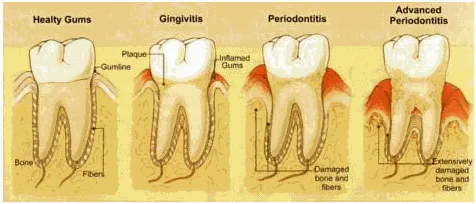A Dutch study detects the presence of non -diagnosed type 2 diabetes in up to 18% of patients with severe periodontitis.
In recent years, numerous studies have been developed in which the relationship between type 2 diabetes and periodontitis has been verified, that is, the usual ‘gum disease’ - compromise known as ‘piorrea’s.
In fact, periodontitis can initiate or accelerate the development of insulin resistance and, therefore, collaborate in the development of diabetes.And on the other hand, patients with this metabolic disease have a much greater risk of periodontitis.
So, is it possible that having this gum disease can help diagnose type 2 diabetes?Well yes.In fact, a study carried out by researchers at the University of Amsterdam (Netherlands) confirms that, indeed, severe periodontitis can be an early sign of type 2 diabetes, so its detection in the consultation by the dentist mustmake him suspect the probable presence of non -diagnosed diabetes.
As Wijnand J. Teeuw, director of this research published in the magazine «BMJ Open Diabetes Research & Amp;Care »,« The screening of patients who come to the dentist's consultation for the treatment of severe periodontitis is a feasible and valuable measure to try to avoid long -term complications of diabetes ».
Detect the disease
In the study, the authors had the participation of 313 adults attended in the University Clinic of the University, of which 109 did not suffer periodontitis, 126 had a slight-moderated periodontitis, and 78 suffered severe periodontitis-with an affectation ofthe bone mass that supports the dental pieces.
The number of participants with type 2 diabetes already diagnosed before passing through the consultation was less than 3% in case they did not have gum disease, 4% for participants with mild-moderate periodontitis, and almost8% for those with serious illness.
The screening of patients with severe periodontitis is a feasible and valuable measure to avoid diabetes complications
Wijnand Teeuw.
The authors measured the levels of glycosylated hemoglobin –HBA1C, a parameter that shows the level of blood sugar-of the participants over 2-3 months, observing a higher average level in the group of patients with severe periodontitis (45 mmol/l) that in those of participants with mild-moderate periodontitis (43 mmol/l) and without gum disease (close to 39 mmol/l).In this context, it should be taken into account that an HBA1C with a value of 39-47 mmol/l reveals the presence of pre-diabetes-and that all value equal to or greater than 48 mmol/l is indicative of diabetes.
But what happened when the authors sought the cases not yet diagnosed with type 2 diabetes?Well, although there was a case in the three groups, the percentage was significantly higher in that of patients with severe periodontitis.Specifically, and while participants' rates with non-diagnosed metabolic disease were 8.5% in the group without gum disease and 10% in mild-moderate periodontitis, in the severe periodontitis groupup to 18%.Or what is the same, almost one in five patients with grave ‘pyorrhea’ was diabetic but I didn't know.
As the authors indicate, “our work is an observational study, so firm conclusions of the type‘ cause and effect ’cannot be drawn.But our results confirm the assumption that severe periodontitis could be an early sign of non -diagnosed diabetes ».
avoid the loss of teeth
But, this higher prevalence of prediabetes and diabetes in the participantsWith severe periodontitis, couldn't it be explained by the presence of other risk factors?Well no.And although it is true that the average body mass index (BMI) was greater in patients with the serious shape of the disease, the rest of risk factors - among others, some total cholesterol figures and a blood pressurehigh - were similar for the three groups.
In short, the study confirms, once again, the close association between periodontitis and diabetes.And also reinforces the evidence that suggests that the dentist's consultation could be an ideal place for the early diagnosis of diabetes.
As Wijnand Teeuw concludes, «the early detection and intervention of prediabetes prevents common micro and macrovascular complications in the disease and is coast-effective.In addition, the diagnosis and treatment of diabetes could also help prevent the risk of long -term associated with dental pieces with severe severe periodontitis ».


